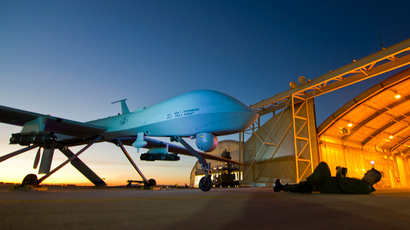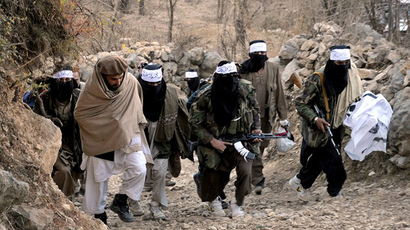US drone strike kills head of Pakistani Taliban
The head of the Pakistani Taliban, Hakimullah Mehsud, was killed by a US drone strike on Friday, Pakistani intelligence officials told Reuters anonymously. Senior sources within the militant group confirmed the death.
“We can confirm, Hakimullah Mehsud was killed in the drone strike,” one senior security official told Reuters.
Agents sent to the site of the attack in North Waziristan region identified Hakimullah Mehsud as one of the killed, said the sources, who wished to remain unnamed as they were not authorized to talk to the media.
According to another intelligence source, the Taliban leader’s
funeral has already been scheduled for Saturday, and will take
place in the main regional city of Miranshah.
At least three people were killed in what is believed to be a US drone strike on the tribal region’s village of Dande Derpa Khel, AP reported quoting intelligence officials.
Reuters sources have, however, put the number of drone strike victims at 25, saying that the chief’s closest men were also killed.
“Among the dead, who are in large numbers, are Hakimullah’s personal bodyguard, Tariq Mehsud, and his driver, Abdullah Mehsud, two of his closest people,” the agency was told.
A house was destroyed by the strike in the village, which is said to be the stronghold of the Haqqani network. The Islamist insurgent network is known for routinely targeting NATO troops in neighboring Afghanistan.
Mehsud, one of Pakistan’s most wanted men believed to be in his
mid-30s, has been reported dead several times before. He took
over the Pakistani Taliban in August 2009 after a drone strike
killed the previous militant leader, his mentor.
Earlier on Friday, regional sources told Reuters that drones had
fired four missiles at the Pakistani village.
It came just hours after the regional leader of the Pakistan
Movement for Justice (PTI), Imran Khan, promised to set a “drones or transit”
ultimatum for the US, stating that the ongoing strikes threaten
the country’s peace talks with the Taliban. Such a move could
hamper next year’s withdrawal of US troops from Afghanistan, and
the delivery of ISAF supplies.

“If drone attacks are carried out during peace talks with the
Taliban, NATO supplies will be stopped,” the politician told
journalists at a Friday press conference.
The debate over potential peace talks between the Taliban and the
new government of Pakistani Prime Minister Nawaz Sharif, who was
elected in May, has been ongoing. An official government
statement announced earlier on Thursday that “the dialogue
with the Taliban has started.”
The Friday drone strike has apparently “finished all hopes that Pakistanis were actually putting on negotiations with the Taliban,” RT’s Tariq Muhi Yuddin reported from Islamabad.
“It seems to be the US stating it wants absolutely nothing to do with the Pakistani government’s stance on this,” Noor Mir, anti-drone campaign coordinator of Code Pink, told RT in an interview.
Mir believes the latest drone strike is a “slap on the face” of Pakistan and its efforts to aid peace talks. She added that Taliban retaliation is likely to come in the form of bombs on the ground in Pakistan that will kill innocent Pakistani civilians.
“When their fearless leader is killed, there’s bound to be a certain amount of revenge that’s going to come out,” Mir said. “Aside from that, we should note that there’s already been another successor of the Mehsud tribe that is now the head…the network is strong enough” for one leader to quickly replace the last.
The Pakistani Foreign Ministry has strongly condemned the attack, which is considered a breach of the country’s sovereignty, he added.
Despite popular outrage at the US attacks, the Pakistani
government apparently values its relations with America and has
been careful in its demands to stop them.
During a recent meeting with US President Barack Obama, Sharif
demanded for drone warfare to be stopped in Pakistan. However, it
was not clear how the Prime Minister will react if the strikes
continue.
A recent UN report has estimated there have been about 400 civilian victims of American drones in Pakistan, Afghanistan and Yemen in total since 2008, while other estimates put that number as high as 900 (Bureau of Investigative Journalism) with the total number of killed reaching 3,595.
However, the Pakistani Defense Ministry has just come out with a dramatically lower number of only 67 civilian casualties in drone attacks.














